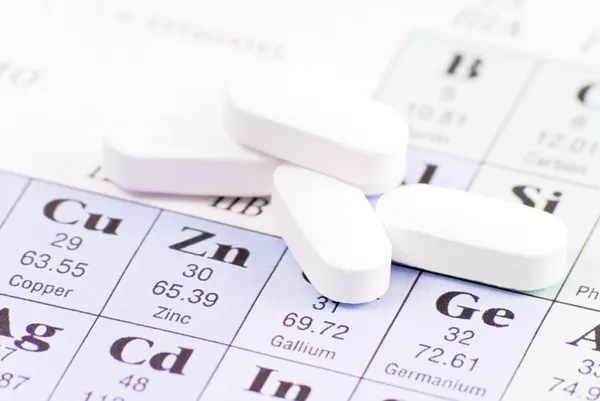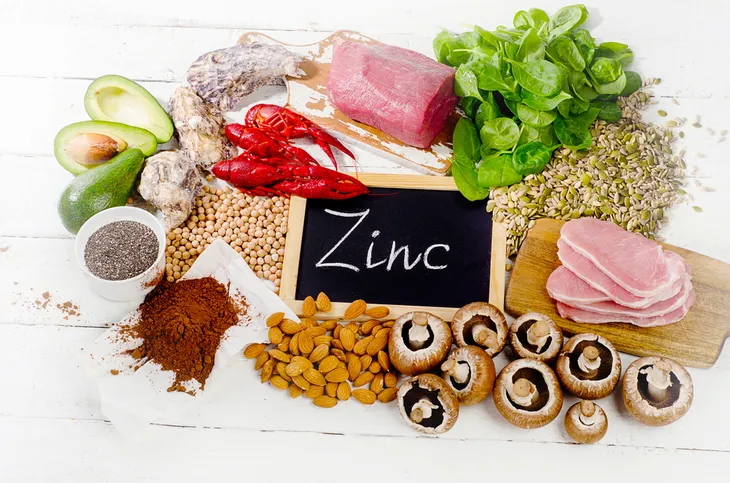Zinc has always been a critical contributor to your overall health. It’s considered an essential micronutrient and trace amounts of it can be found in every single aisle of your local grocery store.
More and more, health-conscious individuals are seeking zinc supplementation in an attempt to cash in on all of its incredible health benefits. But where can it be found, what can it accomplish and how much zinc should you supplement? These are all fantastic questions, and we’ll set out to answer each and every one. Let’s dive in!
The Importance of Zinc
Most of this article will be spent breaking down the benefits of zinc supplementation and explaining the various types available. This will help you browse your local supplement store more confidently.
Having said that, it’s important to understand how critical a role zinc already plays in the modern American diet. Let’s take a look at some of the natural food sources that contain zinc.
Food Sources
Zinc is a foundational micronutrient, and as such, it is all over the grocery store. In the meat department, you’ll find zinc in shellfish, poultry, beef, pork, and lamb.
You can also find zinc in nuts, seeds, eggs, dairy products, whole grains like oats and quinoa, as well as legumes like chickpeas, lentils, black beans, and more. Even certain vegetables contain zinc, like mushrooms, kale, peas, and asparagus.
The Benefits of Supplements
So, if zinc is everywhere and in almost everything, why would you need to supplement it? The truth is, a lot of people don’t need to. However, some individuals choose to supplement with Zinc as a means to ensure they hit their daily zinc goal consistently. After all, some foods are richer in zinc than others.
And trust us, you’ll want to make sure you reach your daily zinc goal. To find out why, keep reading along.
May Boost Your Immune System
Let’s start with the biggest potential benefit of zinc supplementation — its impact on your immune system. There’s plenty of evidence to suggest that healthy levels of zinc in the human body can translate to a healthier person overall.
For example, a study showed individuals suffering from the common cold experienced a shorter duration of the illness compared to those who didn’t supplement at all. In fact, the common cold duration was 33-percent shorter.
Supports Immune Health in Seniors
Another study of the effect of zinc supplementation in the elderly reported similarly positive results as well. The study documented a reduced incidence of infections and a decrease in inflammation.
Better still, this study purports zinc as a particularly effective antioxidant. There are a lot of studies surrounding the importance of zinc on immune function, with most of them repeating the importance of supplementation. Score one for zinc!
May Fight Acne
It appears that zinc supplementation and healthy skin are a match made in heaven.
There’s plenty of evidence to suggest that zinc sulfate can be used to beat back the symptoms of severe acne including papules, cysts, redness, scarring, and more. That’s before even talking about the damage that acne can do to a person’s self-esteem.
This study shows acne sufferers may benefit from taking just 30-milligrams (mg) of elemental zinc a day.
May Decrease Inflammation
The more we learn about inflammation, the more important treating it becomes. Fatigue, fever, mouth sores, rashes, heart disease, cancer, asthma, obesity, rheumatoid arthritis, and even type 2 diabetes are all linked to chronic inflammation. Needless to say, anything that can decrease inflammation is a resounding success.
A daily dose of zinc has been shown to reduce the level of inflammatory proteins in the human body. Need more evidence? This study asked older adults to take 45-mg of zinc per day and tracked their biometrics. The result? All of them experienced reductions in inflammatory markers when compared to the control group.
May Help Control Blood Sugar
The hormone that controls that amount of glucose in your bloodstream, is your body’s blood sugar workhorse. It helps regulate blood sugar levels, which impacts more than most people know. Dramatic blood sugar swings can lead to brain fog, irritability, increased heart rate, and hunger.
There is evidence to suggest that zinc supplementation may help regulate blood sugar levels and improve your body’s overall responsiveness to the hormone that regulates glucose in the body. This study looked at the long and short-term effects of zinc on people with diabetes, and the results were resoundingly positive.
How Much Should You Take?
This is a great question. Unfortunately, the question is difficult to answer in any one-size-fits-all way. Weight, age, and medical history can all impact the optimal dosage of zinc supplementation.
For example, if you’re looking to treat acne, your dosage recommendation could land anywhere between 30-mg a day to 150-mg a day. The dosage recommendations are similarly broad across many medical conditions.
Zinc Supplementation
If you aren’t attempting to treat a specific illness, and you’re over the age of 19, the recommended daily dosage is 40-mg per day.
Either way, you should always consult your doctor first to ensure zinc supplementation is right for you. You should also consult your doctor if you’re experiencing some of the side effects that we’ll talk about next.
Side Effects
Though most of us can handle a relatively steady intake of zinc, taking too much can cause adverse reactions in the body. That’s called zinc toxicity. Symptoms include diarrhea, loss of appetite, nausea, abdominal cramps, headaches, reduced immune function, and a decrease in HDL cholesterol levels.
Yes, there are side effects, but most of them are reported in people who are taking upwards of 60-mg of zinc per day in a supplemental form. Most regular consumers don’t run that risk. If the zinc is consumed through food there’s even less likely chance of toxicity. But it’s always important to monitor your symptoms and reach out for professional help should you experience an adverse reaction.
Should You Start Supplementing?
Zinc is such a powerful, life-altering micronutrient, isn’t it?
Though it’s naturally available in so many of our favorite foods, supplementing it can bring about countless health benefits. Zinc may boost your immune system, fight acne, improve heart health, control blood sugar and so much more!
So, should you start supplementing with Zinc? Well, that depends entirely on your diet. If you aren’t hitting your daily recommended zinc cap, then it may be time to visit your local supplement store and start enjoying the many benefits that come with zinc supplementation.
Signs of a Zinc Deficiency
Now that we have an understanding of the benefits of zinc supplements, it’s important to know the signs of a zinc deficiency. Healthline explains, “when you’re zinc deficient, your body can’t produce healthy, new cells.”
Here are some of the common symptoms that could indicate you’re zinc deficient:
- loss of appetite
- unexplained weight loss
- decreased sense of smell and taste
- diarrhea
- lack of alertness
- open sores on the skin
- wounds that won’t heal
If you experience any of these symptoms make sure you speak with your doctor to find out if you’re deficient in this essential nutrient. It is not recommended to just take zinc because you experience these symptoms. Check with your medical providers, as these symptoms can also be a sign of underlying conditions.
















